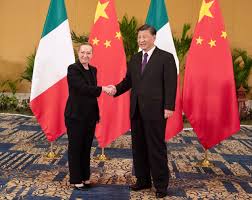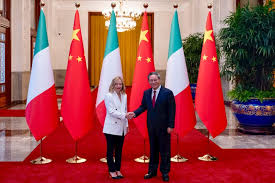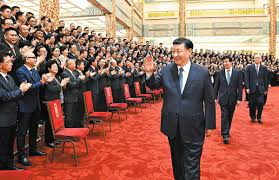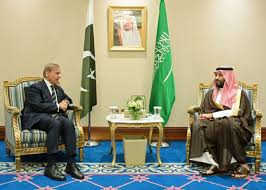Meloni’s visit to China ‘timely,’ pushing China-Italy ties to a new stage: Chinese Ambassador to Italy

Rome: At the end of July, Italian Prime Minister Giorgia Meloni arrived in China for her first China visit since taking office. During her visit, she met with Chinese President Xi Jinping, Chinese Premier Li Qiang, and Zhao Leji, chairman of the National People’s Congress Standing Committee. In an exclusive interview with the Global Times (GT), Chinese Ambassador to Italy Jia Guide (Jia) said that the visit further enhanced the mutual political trust in China-Italy relations, successfully pushing the China-Italy comprehensive strategic partnership to a new stage.

Jia noted that China has placed significant emphasis on Italy’s position and influence within the EU. China hopes that Italy will play a constructive role in promoting dialogue and cooperation between China and Europe, as well as in advancing the positive and stable development of China-Europe relations.
GT: During her visit to China, Meloni said Italy is committed to developing a long-term, stable and sound relationship with China, and that Italy and China should promote further development of the comprehensive strategic partnership. What is your comment on her visit?
Jia: This year marks the 20th anniversary of the establishment of the comprehensive strategic partnership between China and Italy, as well as the 700th anniversary of the death of Marco Polo, a messenger of cultural exchange between East and West. Prior to the visit, the 20th Central Committee of the Communist Party of China concluded its third plenary session, which sent a positive signal that China will continue to promote high-level opening up to the outside world. Meloni’s first visit to China is very “timely.”

Chinese President Xi Jinping met with Meloni during the visit, which drew up a blueprint for the future development of China-Italy relations. Xi said that China and Italy should uphold and promote the Silk Road spirit, view and develop bilateral relations from a historical dimension, strategic height, and long-term perspective, and push their relations to go steady and far.
Premier Li Qiang and Zhao Leji, chairman of the National People’s Congress Standing Committee, also met and held talks with Meloni separately during her visit.
China and Italy also issued a 2024-2027 action plan to strengthen their comprehensive strategic partnership. Li and Meloni witnessed the signing of multiple bilateral cooperation documents covering areas including industry, education, and environmental protection.
Meloni’s visit further solidified the political mutual trust foundation of the development of China-Italy relations, fully demonstrating the strong willingness of both sides to strengthen exchanges and cooperation in the spirit of openness, inclusiveness, mutual learning, and mutual benefit.
Both sides agreed that this visit was a complete success, not only continuing and promoting the traditional friendship, but also deepening and expanding practical cooperation, while successfully advancing the China-Italy comprehensive strategic partnership to a new stage.
GT: How do you view the three-year action plan to strengthen the comprehensive strategic partnership between the two countries? How will it help to promote the development of China-Italy relations?
Jia: The three-year action plan is a landmark document and key action guide for the deepening of China-Italy relations amid the new situation, providing institutional guarantees and directional guidance for the healthy and stable development of bilateral relations in the coming years.
The action plan clearly outlines the future prospects of the China-Italy relationship, emphasizing that both sides are willing to uphold the ancient Silk Road spirit, maintain the momentum of bilateral relations, promote the development of bilateral relations to a higher level, and promote peace and cooperation. The action plan outlines the next practical cooperation steps between China and Italy, with plans to create more cooperation highlights in the fields of economic and trade investment, finance, technological innovation, education, green and sustainable development, healthcare, and cultural exchanges.
It also demonstrates the willingness of both countries to coordinate on China-Europe relations and multilateral issues. Both sides will promote high-level dialogue between China and Europe in strategic, economic and trade, green, digital, and cultural fields, and work together to address global challenges such as climate change, energy transition, public health, security, international peace and stability.
China and Italy are willing to further enhance communication and coordination on multilateral issues, and to encourage the international community to unite and respond to global challenges on appropriate multilateral platforms.
I believe that with the joint efforts of all sectors, the action plan will not only bring tangible benefits to the people in both countries, but also inject more stability into the development of China-Italy and China-Europe relations, as well as the current turbulent world.
People visit an exhibition titled A Journey of Knowledge: The Travels of Marco Polo and Its Legacy between East and West, on July 26, 2024 at the Beijing World Art Museum in Beijing. Photo: VCG
People visit an exhibition titled A Journey of Knowledge: The Travels of Marco Polo and Its Legacy between East and West, on July 26, 2024 at the Beijing World Art Museum in Beijing. Photo: VCG
GT: When meeting with Meloni, Xi noted that China and Italy have complementary industrial advantages and represent opportunities for each other. Xi said both sides should adhere to mutual openness and cooperation. In addition, Li and Meloni witnessed the signing of six new agreements, involving areas such as electric vehicles (EVs) and renewable energy. What do you think of the potential for cooperation between China and Italy in emerging fields? Will these cooperation areas replace traditional cooperation areas between China and Italy?
Jia: China and Italy are both industrial powerhouses and innovation leaders, and their cooperation can achieve a synergistic effect.
Italian companies have been involved in cooperation projects such as China’s domestically produced large cruise ships, domestically produced large aircraft, offshore wind power projects, and electromagnetic testing and verification satellites. The two countries are now exploring and cultivating new areas of cooperation in high-end manufacturing, clean energy, aerospace, and other emerging fields and formats.
After this visit, Chinese and Italian companies in the photovoltaic and wind power sectors signed new cooperation agreements, and the two countries will also hold the 13th China-Italy Innovation Cooperation Week in November to further discuss innovation cooperation.
It can be said that there is vast potential for cooperation in emerging fields between the two countries. China-Italy cooperation is an ongoing process with no end in sight. China is willing to work together with Italy to promote the optimization and upgrading of traditional cooperation in trade, investment, industrial manufacturing, and technological innovation, as well as to explore cooperation in emerging fields such as smart manufacturing, new energy, electric vehicles, and artificial intelligence, to help both countries optimize their economic structures and promote industrial upgrading.
GT: Meloni has hailed China as an “important interlocutor” in managing global tensions, and said, “Italy can have an important role in EU relations and creating balanced relations.” How do you evaluate such remarks?
Jia: China highly appreciates Meloni’s statements. China and Europe are two major forces promoting multipolarity, two major markets supporting globalization, and two major civilizations advocating diversity.
The essence of China-Europe cooperation is complementary advantages and mutual benefit. Italy is an important founding member of the European Union, and China attaches great importance to Italy’s position and influence within the EU. China hopes that Italy will play a constructive role in promoting dialogue and cooperation between China and Europe, and in promoting the positive and stable development of China-Europe relations.
In the era of economic globalization, countries should communicate and unite to move forward together, as isolation and division will only lead to setbacks.
Recently, some European countries have been considering imposing temporary extra tariffs on EVs imported from China. This move is not only unfair to Chinese companies, but also unfair to European consumers, including those in Italy.
It will also disrupt the EU’s own green transition and global cooperation in addressing climate change. The volume of economic and trade cooperation between China and Europe is large, so it is inevitable that there will be some bumps along the way. Both sides should adhere to the spirit of free trade, fair competition, and open cooperation, and, based on the rules of the World Trade Organization, resolve trade frictions through dialogue and negotiation.
China is willing to work together with Italy to continue to provide a fair, safe, and non-discriminatory business environment for investments and operations in each other’s countries, and jointly promote the development of China-Europe economic and trade relations toward a more certain, predictable, balanced, and mutually beneficial direction.
GT: You accompanied Meloni during her visit to China. Were there any interactions, details, or exciting moments that left a deep impression on you?
Jia: Meloni’s visit to China was truly full of highlights. During an exhibition themed around Marco Polo and the Silk Road, Meloni left a message emphasizing the need to further smooth the exchanges between civilizations in the East and West, and to jointly promote China-Italy economic, technological, and cultural cooperation on this basis.
She also highlighted the importance of strengthening the ties between the two nations that have spanned centuries, vividly reflecting her deep thought on promoting pragmatic cooperation through mutual learning between civilizations.
Bringing her young daughter to China, tasting and praising traditional Chinese cuisine, and trying on a traditional Chinese “Mamianqun” skirt – these actions were praised by many Chinese netizens as “showing the empathetic side of a female leader as a mother.” These moments demonstrated the shared value placed on traditional family concepts by both China and Italy and the beautiful expectation of passing down this friendship from generation to generation.
Additionally, it is worth noting that during Meloni’s visit to China, both the Beijing Central Axis and the Ancient Roman Appian Way in Italy were simultaneously admitted to the UNESCO World Heritage List. This shared honor further highlights the harmonious coexistence of the two great ancient civilizations of China and Italy, fostering another fine chapter in China-Italy cultural exchanges.





